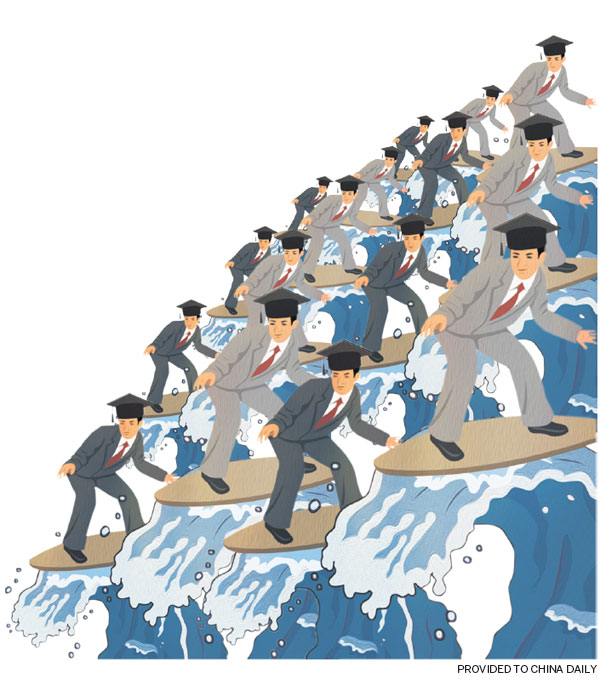80 percent of Chinese studying at overseas universities are returning to their homeland to fulfill their potential as professionals
Several decades ago, the returning Chinese students from overseas studies were mostly out of patriotism to revive the homeland, now they are back for opportunities to fully develop their potential.
The reasons behind the backflow vary. But they all derive from one simple fact: an ever-stronger China, both economically and culturally, is becoming increasingly charming.
'Let's go back to China!'

"I took only 3 minutes to make my final decision," said Zhang Ji, a Chinese returnee from Canada, while recalling the life-changing moment when he made up his mind to return to China to start up his own business.
Zhang returned to China in 2009, bringing back a world-leading heart valve implantation system.
After a 30-minute presentation, Zhang received an investment of 10 million yuan from domestic entrepreneurs, strong policy support of the local government as well as the green light from the authorities.
But opportunities always coexist with challenges. The road to success back in the homeland is not all rosy.
Dedicating himself to medical device innovation, research and development in China, Zhang found it hard to update his medical license in Canada in a timely manner, which means he has to give up his well-paid job there.
In Canada, he could earn in five days what he gets paid in China in a month. Some of Zhang's friends didn't understand why he chose to return to China, saying he made a "silly" choice. But Zhang thought otherwise.
"Yes, I quit an 'iron rice bowl' job, but I get an opportunity to fulfill my dreams, to start up my own business," Zhang said.
Confident about the potential clinical and market value to be generated by his advanced technology, Zhang believes his business has a "boundless prospect."
In contrast with Zhang's highly efficient "3-minute" decision-making, Li Peixiang took quite some time to make up his mind to go back to China.
After all, Li had already made his mark in Canada's biological material industry after over 20 years of endeavor. His ABM company has been identified by the Canadian government as one of the five most promising companies in Vancouver.
With a mindset of having a try, Li participated in the Nanjing "321 Talents Program" in late 2012. After being successfully recruited, Li soon received the investment and subsidies from the local government, and the expertise and insights in biological materials of many local officials and investors also impressed him much.
After making the first step, Li started to build a bigger ambition for the years to come. He set up another new company in Zhenjiang, a city in the eastern Jiangsu province.
"I hope the company's sales achievement could reach 100 million yuan and be listed on the stock market in five years," Li said.
'I have to be grateful!'
"I can go home next month," said Cao Zuonan, an ecology graduate student at Germany's University of Tuebingen, while walking out of the supervisor's office joyfully.
His graduation design program - research on the experimental methodology of the nutrient in the Chinese Qinghai-Tibet Plateau soil - has just been approved by his supervisor and he is about to return to China to collect soil samples.
Cao, born in the 1990s, spent the first 18 years of his life in Xining city of Qinghai province. He had always longed for the magnificent plateau in his hometown during his study in Germany.
He made up his mind go to Germany for further studies when he was at college and then to return to China, because it is his unshakable faith to dedicate himself to environmental protection.
"I have to be grateful! I have been thinking about how I can pay back to my parents, my fellow countrymen and the land that has brought me up since the start of my college time," said Cao passionately.
'Let's make core strategies!'
Ding Xianfeng still relishes his decision of leaving the Silicon Valley to join Huawei.
"If I did not quit the job of sensor system platform architect at Intel and returned to serve as director and chief scientist at Huawei's sensor lab, I would not become a leader in the world's sensor industry," said Ding proudly.
Huawei, one of the top three research companies for mobile application sensors, enjoys an enormous competitive edge.
"Compared to working in the United States, my influence on the development of the sensor industry in the world has grown hundreds of times ... I represent purchaser who needs sensors that worth 2 billion U.S. dollars," Ding told Xinhua.
Many returnees said they went back to China because of the "glass ceilings," meaning foreigners can never climb to the top of the ladder no matter how talented and hardworking they are.
"Only when you are back in China can you make core strategies," said Ding repeatedly.
Things are similar for Huang Xiaobo. "At that time, most of my classmates were studying abroad. But many of them are just doing trivial jobs, their talent wasted," sighed Huang.
After years of efforts, Huang has become the director of the Institute of Lithotripsy Application at Peking University and an academic leader of the Department of Urology at Peking University People's Hospital.
Huang did not regret his decision.
"Urology is one of the popular professions in the United States. It is barely possible that a Chinese can become the head of the urology department at any mainstream U.S. hospital," Huang said.
According to the Chinese Education Ministry, around 80 percent of overseas students have returned home in recent years, compared with about a third in 2006.
The Chinese governments at all levels are striving to entice students back. For instance, China is now home to over 300 industrial parks aimed at incubating startups led by returnees. Witnessing the ever-growing motherland and government incentives and business opportunities, the returnees, without much hesitation, are packing their bags for their flights home.
Xinhua
